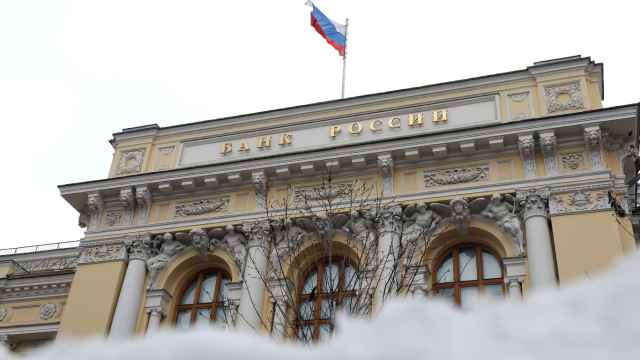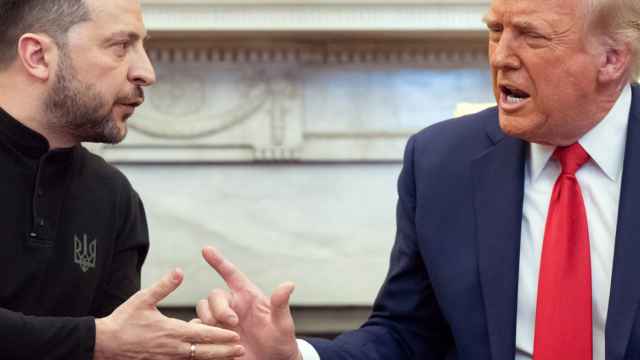For the second time in a decade, Russia's policy toward Ukraine has disrupted the country's delicate balance, turning its contradictions into conflicts and creating a situation that runs counter to the Kremlin's goals and interests.
The first time Russia made this mistake was in 2004, when the Kremlin — and, above all, then-President Vladimir Putin personally — backed Viktor Yanukovych to win the presidential election. Although Moscow invested significant financial and political resources in support of his campaign, the result of the rigged runoff election triggered the Orange Revolution and marked an ignominious defeat for Russian policy toward its close neighbor.
The shock of these events lived long in the memory of Russia's leaders and cemented their conviction that they were competing in their own backyard with Western powers that were committed to destabilizing Russia.
Chastened by this experience, Moscow appeared to have learned some lessons. It meddled less conspicuously in Ukrainian politics, keeping a low profile in the 2010 presidential election, for example, which saw Yanukovych narrowly defeat Yulia Tymoshenko. The failure of Ukraine's "Orange" leaders to seize their chance and bring better governance and living standards to their citizens allowed for the political reincarnation of Yanukovych. This suggested that in the long run, Russia stood a reasonable chance of keeping Ukraine where it wanted it — tied to Russia's apron strings, largely unreformed and unable to integrate with the West.
Two months ago, Russia scored what many observers saw as its latest significant foreign policy victory by pressuring Yanukovych not to sign an association agreement with the European Union. Yet this was all just a game of appearances. Moscow simply figured out what Yanukovych was doing and what he really wanted more quickly than the EU could.
To prepare for re-election in 2015, he urgently needed to plug the hole in Ukraine's finances and saw negotiating simultaneously with the EU and Russia, playing one off the other, as a tool for boosting support. The Russian deal was simple: a $15 billion cash injection, a one-third cut in the gas price in return for Russian co-ownership of strategic industrial assets and a commitment not to pursue integration with the EU.
Yet no sooner had the deal been made than the law of unintended consequences took hold again, just as it had in 2004, crudely exposing Moscow's perennial blind spot in dealing with Ukraine. Russian policy makers had again failed to properly analyze the state of Ukrainian society and its growing alienation from its leaders. Many Ukrainians associated integration with the EU with the establishment of rule of law, a curb on rampant stealing by government officials and their cronies and the prospect of even a modest improvement in living standards. Moscow's policy of drawing Ukraine away from the EU antagonized millions of Ukrainians.
As a result, the Euromaidan demonstrations in Kiev quickly became anti-Yanukovych protests that released simmering anger in Ukrainian society with the president and his government. This deep and widespread dissatisfaction with the way the country has been ruled since 2010 metamorphosed overnight into violent social revolt when Yanukovych enacted repressive, anti-constitutional legislation on a Russian model in a bid to end the protests.
By propping up Yanukovych and perpetuating the status quo, Moscow involuntarily put a set of events in motion that have left it facing a crisis with three unpleasant consequences for Russian interests.
First, Ukraine is now radicalized, unstable and in real danger of breaking apart. An angry and disillusioned society has outgrown its leaders and is desperately searching for new ones. Second, Russia's strategic goal of keeping Ukraine in a tighter Russian embrace is clear to large sections of Ukrainian society and can no longer be packaged as "brotherly assistance." Third, Moscow is experiencing the alarming precedent of spontaneous, homegrown "people power" that is crippling a post-Soviet government in a country with which Moscow feels a deep affinity.
If the aftereffects of 2004 reinforced paranoia about Western forces bent on undermining Russia and its interests, these latest events have the potential to trigger far stronger intolerance of dissent within Russia itself.
How could Moscow have miscalculated on such a scale?
The difficulty of separating perception from reality creates a poor basis on which to build strategic policymaking. Russia's leaders view Ukraine through the emotional prism of shared history, culture and experience spanning several centuries. They see it as a territory that achieved independence in 1991 only because of a historical aberration. They have never truly accepted Ukraine's existence as an independent and sustainable country with its own identity. In Putin's words, Ukrainians and Russians are "one people." He has described Ukraine as a state rather than a country. Since the collapse of the Soviet Union, Russia's leaders, by default, have thought of Ukraine as land that was torn away from them by accident, unable to exist without a close alliance with Russia.
Perhaps largely because of these blinders, Russian policy makers have failed to grasp the reality of Ukraine, particularly the rapid development of civil society and its growing sense of independent political identity. Former Ukrainian President Leonid Kuchma's mantra that "Ukraine is not Russia" was part of a careful and sustained nation-building exercise that increasingly differentiated Ukraine from Russia, and it has led many Ukrainians to see more clearly that Ukraine's geography, history and traditions give it a basis for a different and more promising type of political development compared to Russia.
Moscow urgently needs to change its strategy to avoid further escalating tensions in Ukraine and, together with the U.S. and EU, encourage a political process that can hold the country together. To do so, it must put aside emotions and paranoia and analyze the real causes of the revolutionary processes sweeping the country.
John Lough is a vice president with BGR Gabara Limited, a London-based international communications consultancy and an associate fellow with the Russia & Eurasia Program at Chatham House.
A Message from The Moscow Times:
Dear readers,
We are facing unprecedented challenges. Russia's Prosecutor General's Office has designated The Moscow Times as an "undesirable" organization, criminalizing our work and putting our staff at risk of prosecution. This follows our earlier unjust labeling as a "foreign agent."
These actions are direct attempts to silence independent journalism in Russia. The authorities claim our work "discredits the decisions of the Russian leadership." We see things differently: we strive to provide accurate, unbiased reporting on Russia.
We, the journalists of The Moscow Times, refuse to be silenced. But to continue our work, we need your help.
Your support, no matter how small, makes a world of difference. If you can, please support us monthly starting from just $2. It's quick to set up, and every contribution makes a significant impact.
By supporting The Moscow Times, you're defending open, independent journalism in the face of repression. Thank you for standing with us.
Remind me later.







